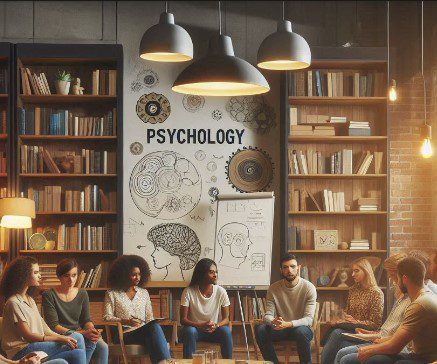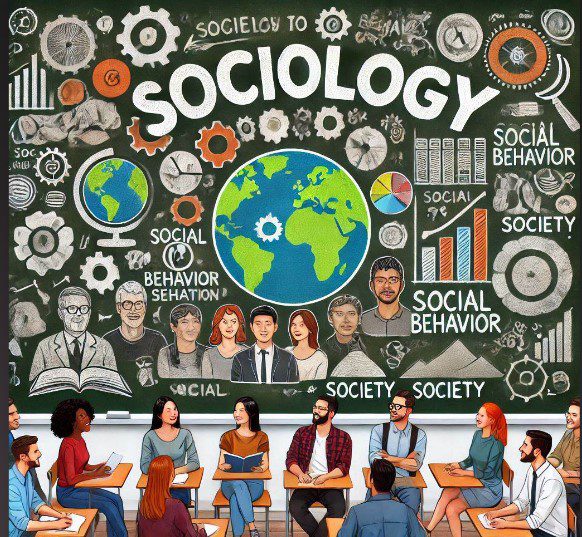Psychology is one of the most fascinating and essential disciplines in understanding human behavior, thoughts, and emotions. It plays a crucial role in various fields, from mental health to education, business, and even artificial intelligence. By exploring its definition, nature, and goals, we can gain deeper insights into the workings of the human mind and its impact on society.
Psychology is not just about diagnosing mental illnesses or counseling individuals—it is a broad scientific discipline that studies how people think, feel, and behave in different situations. Over the years, psychology has evolved to include various subfields, each with its unique approach to understanding human nature.
Understanding Psychology
Definition of Psychology
Psychology is the scientific study of behavior and mental processes. It seeks to understand how individuals think, feel, and act in different situations by analyzing cognitive, emotional, and social factors.
The word psychology originates from the Greek words psyche (meaning “soul” or “mind”) and logos (meaning “study” or “discourse”). While early psychology was rooted in philosophy, modern psychology is an empirical science that relies on research, experimentation, and observation to draw conclusions.
Psychologists explore a wide range of topics, including memory, perception, motivation, personality, intelligence, and mental disorders. By applying scientific methods, they uncover patterns of behavior and develop theories to explain how the mind works.
Brief History and Evolution of Psychology
The study of psychology dates back to ancient civilizations, but it officially became a scientific discipline in the late 19th century. Some key milestones include:
- Ancient Philosophy: Thinkers like Plato and Aristotle pondered questions about the mind, consciousness, and human nature.
- Structuralism (Wilhelm Wundt, 1879): Wundt established the first psychology laboratory, marking psychology as a formal science.
- Functionalism (William James): Emphasized the purpose of behavior and mental processes.
- Psychoanalysis (Sigmund Freud): Explored unconscious motives and childhood experiences.
- Behaviorism (John B. Watson, B.F. Skinner): Focused on observable behavior rather than introspection.
- Humanistic Psychology (Carl Rogers, Abraham Maslow): Stressed personal growth and self-actualization.
- Cognitive Revolution (1950s-60s): Emphasized mental processes like memory, problem-solving, and decision-making.
- Modern Psychology: Incorporates neuroscience, artificial intelligence, and applied psychology in various domains.
The Nature of Psychology
1. Psychology as a Science
Psychology is a scientific discipline because it follows systematic methods of inquiry, observation, and experimentation. Psychologists use empirical research methods to gather data, analyze behavior, and test hypotheses. The scientific nature of psychology is evident in:
- Controlled experiments and observations
- Use of statistical analysis to validate theories
- Development of psychological tests and assessments
- Ethical guidelines for research and practice
Unlike philosophy, which relies on reasoning and speculation, psychology employs empirical methods to understand human behavior objectively.
2. Psychology as a Social and Biological Science
Psychology bridges the gap between social sciences and biological sciences:
- As a social science, psychology examines human interactions, cultural influences, and social behaviors. It overlaps with sociology, anthropology, and economics in understanding group behavior and societal trends.
- As a biological science, psychology studies brain function, genetics, and physiological responses. It integrates findings from neuroscience, genetics, and medicine to understand mental processes.
3. Psychology as an Applied and Theoretical Discipline
Psychology is both theoretical and applied:
- Theoretical psychology focuses on understanding fundamental principles of behavior, cognition, and emotions.
- Applied psychology uses psychological principles to solve real-world problems in areas such as mental health, education, business, and sports.
Some of the major applied fields of psychology include:
- Clinical Psychology: Treating mental illnesses and emotional disorders.
- Educational Psychology: Enhancing learning and teaching strategies.
- Industrial-Organizational Psychology: Improving workplace productivity and employee well-being.
- Forensic Psychology: Applying psychology in legal and criminal investigations.
- Health Psychology: Studying the impact of behavior on physical health.
4. Psychology as a Dynamic and Evolving Field
Psychology is constantly evolving, incorporating new research, technology, and societal changes. With advancements in artificial intelligence, neuroscience, and data science, modern psychology continues to expand its boundaries. Emerging fields like digital psychology, cyberpsychology, and neuropsychology demonstrate the discipline’s ability to adapt to contemporary challenges.
The Goals of Psychology
Psychology has four primary goals that guide research, diagnosis, and intervention strategies:
1. Describe Behavior
The first goal of psychology is to observe and describe behavior accurately. Psychologists gather information on how individuals behave in different situations and document patterns.
For example, a psychologist studying anxiety might describe how it manifests physically (rapid heartbeat, sweating) and emotionally (fear, nervousness). Descriptive research methods include case studies, surveys, and naturalistic observations.
2. Explain Behavior
Once behavior is described, the next goal is to understand why it occurs. Psychologists develop theories and models to explain mental processes and emotional reactions.
For instance, cognitive psychology explains memory loss using theories of information processing, while psychoanalysis attributes it to unconscious conflicts. Different psychological perspectives provide diverse explanations for the same behavior.
3. Predict Behavior
By understanding psychological patterns, psychologists can predict future behavior. Predictive studies help anticipate how individuals might react in specific situations.
For example, if research shows that stress leads to burnout, employers can predict which employees are at risk and implement wellness programs. Prediction is crucial in fields like mental health, education, and marketing.
4. Control or Influence Behavior
The ultimate goal of psychology is to improve well-being by modifying harmful behaviors and promoting positive changes. Psychological interventions include:
- Cognitive Behavioral Therapy (CBT): Helps individuals change negative thought patterns.
- Behavior Modification Techniques: Used to encourage healthy habits.
- Educational Strategies: Enhance student learning outcomes.
- Workplace Training: Boosts productivity and employee engagement.
By applying psychological principles, psychologists can help individuals lead healthier, more fulfilling lives.
Conclusion
Psychology is a vast and dynamic field dedicated to understanding human thought, emotion, and behavior. Defined as the scientific study of mental processes and behavior, psychology has evolved into an interdisciplinary science that integrates both social and biological perspectives.
The nature of psychology as a scientific, applied, and evolving discipline allows it to address real-world challenges effectively. Whether through describing, explaining, predicting, or influencing behavior, psychology plays a crucial role in shaping mental health, education, business, and society.
As research and technology continue to advance, psychology will remain an essential tool for improving human well-being and unraveling the complexities of the mind.
FAQs
What is psychology?
Psychology is the scientific study of behavior and mental processes, exploring how individuals think, feel, and act.
Why is psychology considered a science?
Psychology follows empirical research methods, including observation, experimentation, and statistical analysis, making it a scientific discipline.
What are the four main goals of psychology?
The four primary goals are to describe, explain, predict, and control behavior.
How does psychology help society?
Psychology contributes to mental health treatment, education, business efficiency, criminal justice, and overall well-being.
What are some major branches of psychology?
Key branches include clinical psychology, cognitive psychology, educational psychology, industrial-organizational psychology, and forensic psychology.
How has psychology evolved over time?
Psychology has evolved from philosophical speculation to a rigorous science, incorporating neuroscience, artificial intelligence, and digital research methodologies.
Learn Psychology concepts with Societyopedia forum!


